Welcome to the Department of Economics
We are one of the oldest Economics departments on the continent and one of the largest in the university. We are dedicated to quality research and teaching, with a focus on economic issues pertaining to South Africa and Africa. For any information not on this site, please contact the [protected email address] .
Visit us on Facebook and sign up to receive our quarterly newsletter.
Chancellor's award recognises Johan Fourie for social impact
 The Department proudly acknowledges and congratulates Prof Johan Fourie for being awared the Chancellor’s Award for Social Impact. The picture, with Rector and Vice-Chancellor of Stellenbosch University, Prof Deresh Ramjugernath, was taken at the graduation ceremony where the award was formally presented (December 2025).
The Department proudly acknowledges and congratulates Prof Johan Fourie for being awared the Chancellor’s Award for Social Impact. The picture, with Rector and Vice-Chancellor of Stellenbosch University, Prof Deresh Ramjugernath, was taken at the graduation ceremony where the award was formally presented (December 2025).
The official citation accompanying the award highlights Prof Fourie's achievements: "This honour recognises his exceptional and sustained efforts to share economic ideas beyond academia. Guided by the principle of turning history into usable knowledge, he has bridged the gap between the university and the public. Through his newsletter Our Long Walk, read in over 100 countries, as well as his columns, podcast and book, he empowers informed public debate. A leading researcher and director of an active centre, Professor Fourie exemplifies academic excellence combined with meaningful social engagement."
Francis Wilson Memorial Prize for Data-Driven Research awarded to Dr Tsepang Khumalo
 Dr Tsepang Khumalo has been awarded the Dissertation Prize for the Francis Wilson Memorial Prize for Data-Driven Research 2025 for her chapter "The mental health impact for adolescents ageing out of South Africa's child support grant".
Dr Tsepang Khumalo has been awarded the Dissertation Prize for the Francis Wilson Memorial Prize for Data-Driven Research 2025 for her chapter "The mental health impact for adolescents ageing out of South Africa's child support grant".
The research, supervised by Professor Marisa von Fintel and Professor Ronelle Burger, uses the National Income Dynamics Study (NIDS) dataset to examine how the cessation of the child support grant affects the mental health of young beneficiaries in South Africa. She finds that becoming ineligible for the cash transfer leads to a decline in mental health. The study provides crucial insights into an often-overlooked aspect of social protection: how and when cash transfers are withdrawn, particularly when this coincides with critical life stages.
Farewell Rachel
 The end of this year marked the retirement of Prof. Rachel Jafta from her formal role as Professor in the Economics Department. Rachel began her journey in Economics at the University of the Western Cape and completed her PhD studies at Stellenbosch University. She continued her academic studies at Università degli Studi Luigi Bocconi in Milan, Italy and Harvard Business School where she studied strategic negotiations.
The end of this year marked the retirement of Prof. Rachel Jafta from her formal role as Professor in the Economics Department. Rachel began her journey in Economics at the University of the Western Cape and completed her PhD studies at Stellenbosch University. She continued her academic studies at Università degli Studi Luigi Bocconi in Milan, Italy and Harvard Business School where she studied strategic negotiations.
In the private sector, Rachel co-founded the economic consultancy firm Econex with Dr. Nicola Theron in 2005. She is also the Chair of the Media24 board of directors, a non-executive director for the Prosus Group and a member of the Governance Committee of the Bureau of Economic Research.
Department mourns loss of Rudolf Gouws
 The Department of Economics sadly learned of the recent passing of Rudolf Gouws. He had a deep and long-lasting relationship with the Department, initially as student (completing his Master's degree in 1971) and later as honourary professor. He was also a member of the BER governance committee and was always willing to share his extensive knowledge of economic policy and its practical application with students. He was well known for his lucid and engaging presentations in economics, particularly relating data from the national accounts to various developments in economic policy and international developments. He often presented his analysis to colleagues at the BER and the department, including special lectures to both undergraduate and postgraduate students in economics, who enthusiastically soaked up his first-hand accounts of developments in the South African economy, thus inspiring many to further their careers in economics themselves.
The Department of Economics sadly learned of the recent passing of Rudolf Gouws. He had a deep and long-lasting relationship with the Department, initially as student (completing his Master's degree in 1971) and later as honourary professor. He was also a member of the BER governance committee and was always willing to share his extensive knowledge of economic policy and its practical application with students. He was well known for his lucid and engaging presentations in economics, particularly relating data from the national accounts to various developments in economic policy and international developments. He often presented his analysis to colleagues at the BER and the department, including special lectures to both undergraduate and postgraduate students in economics, who enthusiastically soaked up his first-hand accounts of developments in the South African economy, thus inspiring many to further their careers in economics themselves.
Fifth Annual UP-SU PhD Workshop in Economics Held
 This year's annual Pretoria-Stellenbosch PhD Workshop in Economics was hosted by Stellenbosch University and took place on Wednesday, November 5th, 2025. This is the fifth time the workshop has been held, continuing the tradition of collaboration between the two departments to support junior researchers.
This year's annual Pretoria-Stellenbosch PhD Workshop in Economics was hosted by Stellenbosch University and took place on Wednesday, November 5th, 2025. This is the fifth time the workshop has been held, continuing the tradition of collaboration between the two departments to support junior researchers.
The workshop accepted six papers by PhD students from universities across South Africa, covering topics ranging from health economics and innovation to monetary policy and labor markets. The presentations were held in the Van der Sterr Building in Stellenbosch.
Stellenbosch wins big at Young Economist Competition 2025
 The Young Economist competition hosted its 21st annual event on the 22nd of October. Students from three Western Cape Universities (SU, UCT and UWC) competed for the title of Young Economist 2025. Students were required to forecast eight economic indicators and provide a short motivation explaining the rationale behind their forecasts. A total of 158 students participated in the forecasting challenge with Stellenbosch University leading the pack with 81 students in total enrolled in the competition. Students who placed in the top ten were invited to the prize-giving event at Nasdak.
The Young Economist competition hosted its 21st annual event on the 22nd of October. Students from three Western Cape Universities (SU, UCT and UWC) competed for the title of Young Economist 2025. Students were required to forecast eight economic indicators and provide a short motivation explaining the rationale behind their forecasts. A total of 158 students participated in the forecasting challenge with Stellenbosch University leading the pack with 81 students in total enrolled in the competition. Students who placed in the top ten were invited to the prize-giving event at Nasdak.
Alessandro Mangiagalli from Stellenbosh University placed first (third from right) and Mia Rossouw and Stefanus Burden (first and second from right) placed second. Zane Alexander (center) placed sixth, Tasmeen Faro (far left) placed seventh and Hylton Lotter placed ninth (second from left).
Stellenbosch students win Discovery GradHack 2025 competition
 A team of four Stellenboch University students (Mia Olivier, Jaime Kruger, David Nicolay, and Kayleigh Koekemoer) won this year's Discovery GradHack competition. Discovery provided teams with an oportunity to be part of their work environment whilst solving real world problems with the aid of technology.
A team of four Stellenboch University students (Mia Olivier, Jaime Kruger, David Nicolay, and Kayleigh Koekemoer) won this year's Discovery GradHack competition. Discovery provided teams with an oportunity to be part of their work environment whilst solving real world problems with the aid of technology.
A total of 200 students entered the competition. The winning team from Stellenbosch University (VitaliTeam) created an AI-voice powered system which can be used to identify insurance fraud. Discovery awared each member of the team with R15 000 and gave an additional R50 000 to Stellenbosch University.
The Department is immensely proud of this achievement.
Economics Society of South Africa (ESSA) biennial conference 2025
 The Economics Society of South Africa (ESSA)hosted its biennial conference at the Lord Charles Hotel in Somerset West this year. The gathering also marked a remarkable milestone for ESSA as it celebrated its 100th year anniversary. The Department was proud to participate in this year’s conference. Several of our staff members and postgraduate students presented their latest research, contributing to vibrant discussions and debates. Their work highlighted both the department’s strong academic presence and its commitment to engaging with academic research.
The Economics Society of South Africa (ESSA)hosted its biennial conference at the Lord Charles Hotel in Somerset West this year. The gathering also marked a remarkable milestone for ESSA as it celebrated its 100th year anniversary. The Department was proud to participate in this year’s conference. Several of our staff members and postgraduate students presented their latest research, contributing to vibrant discussions and debates. Their work highlighted both the department’s strong academic presence and its commitment to engaging with academic research.
The Department’s CCLE was privileged to host Professor Justus Haucap from the Düsseldorf Institute for Competition Economics (DICE) at Heinrich Heine University, who delivered a keynote presentation on "Merger Control, Innovation, and Industrial Policy: A European (and Personal) Perspective" at the Economic Society of South Africa Centenary Conference. Professor Haucap's insights on the evolving landscape of European competition policy provided valuable perspectives for South African practitioners and academics.
Debra Shepherd featured
 Prof Debra Shepherd, an associate professor in the Department of Economics has been featured on the University's news blog for women's month to celebrate academic staff at Stellenbosch University (SU) who are shaping minds and inspiring excellence through their teaching.
Prof Debra Shepherd, an associate professor in the Department of Economics has been featured on the University's news blog for women's month to celebrate academic staff at Stellenbosch University (SU) who are shaping minds and inspiring excellence through their teaching.
Happy 10th birthday, LEAP!
![]() It has been ten years since LEAP, the Laboratory for the Economics of Africa’s Past, was established. Now formalised as a Type 1 research centre in the University, it has become central in its field, made considerable scholarly impact, and provided resources and organisational structure that have brought many of our Department’s colleagues and students together, shaping their academic work and supported their career development.
It has been ten years since LEAP, the Laboratory for the Economics of Africa’s Past, was established. Now formalised as a Type 1 research centre in the University, it has become central in its field, made considerable scholarly impact, and provided resources and organisational structure that have brought many of our Department’s colleagues and students together, shaping their academic work and supported their career development.
For more, read this blog post, in which Prof Johan Fourie, the centre's director, reflects on the first ten years of the centre.
BER and Department of Economics double event
The Bureau for Economic Research (BER) and the Department of Economics recently hosted an event with two parts: A presentation by the Organisation for Economic Co-operation and Development (OECD), which focused on the main findings and recommendations of the 2025 OECD Economic Surveys Report for South Africa, followed by a discussion with Deputy Governor of the South African Reserve Bank (SARB) Fundi Tshazibana about the role of central banks in addressing climate-related risks.
For more details, including photos, please visit these reports on the University news blog:
Department says goodbye to Stan du Plessis
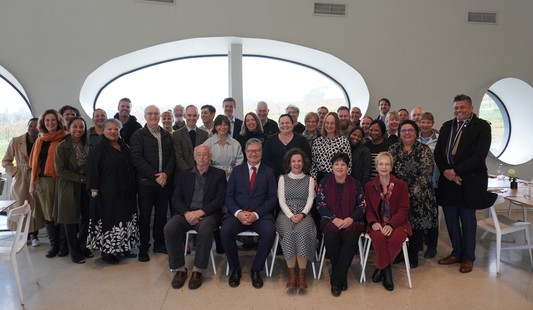 The Department recently hosted a farewell function at Louisvale winery for Prof Stan du Plessis, who recently left the university after 25 years of service, first as lecturer, later as professor in the Economics Department, then dean of the Faculty of Economic and Management Sciences and finally the university's chier operating officer (COO) for the past seven years.
The Department recently hosted a farewell function at Louisvale winery for Prof Stan du Plessis, who recently left the university after 25 years of service, first as lecturer, later as professor in the Economics Department, then dean of the Faculty of Economic and Management Sciences and finally the university's chier operating officer (COO) for the past seven years.
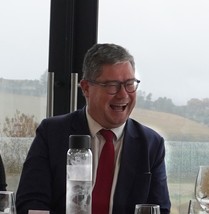 In attendance were present and past colleagues of the department who have worked with Prof du Plessis, many of whom shared fond memories of their interactions with Prof du Plessis as students and as colleagues.
In attendance were present and past colleagues of the department who have worked with Prof du Plessis, many of whom shared fond memories of their interactions with Prof du Plessis as students and as colleagues.
Professor du Plessis's association with Stellenbosch University began in 1991 when he joined as an undergraduate student. Initially enrolled in actuarial science, his academic path shifted toward economics, influenced by the inspiriational teaching of Professor Sampie Terreblanche. He received both the Cloete and Schumann medals awarded to the top student in the department and the broader faculty during his undergraduate and Honours degree studies.
After postgraduate studies at the University of Cambridge, followed by work in the financial sector in London, du Plessis returned to Stellenbosch as lecturer in Economics in 1999. He championed efforts to bring Stellenbosch's Economics department into closer alignment with international standards in both teaching and research. His initiatives included introducing technically advanced course material, establishing specialised econometrics modules, and initiating the intervarsity postgraduate mini-conference with UCT and UWC, an event that continues to thrive today.
As a researcher, Professor du Plessis has been both prolific and wide-ranging. While best known for his work in monetary economics, he has published in areas including economic methodology, competition policy, philosophy, and even theology, across platforms as diverse as Economic Modelling, The Oxford Handbook of Philosophy and Economics, and the International Journal of Public Theology. He continues to be one of South Africa's most cited economists. Even after assuming senior leadership roles, he has maintained an impressive research output and remained an important voice in public economic discourse.
For more detail on Prof Stan du Plessis's career and person, read the report on the University's news blog. See also this article on (a different) farewell function including quotations from the university's rector and others.
(Thanks to Rulof Burger for contributing to this article.)
Rebecca Bruens wins Founder's Medal 2024
 Rebecca Bruens won this year's prestigous Founder's medal in the Honour's postgraduate category of 2024. Rebecca was supervised by Prof. Debra Sheperd and her thesis was titled "Counting the social class: The role of class imagery and subjective social location of preferences towards redistributive policy in South Africa". Her research investigated preferences regarding redistributive policies and the role that subjective perceptions of social status and class imagery play in affecting perspectives regarding redistributive policies in South Africa (abstract below).
Rebecca Bruens won this year's prestigous Founder's medal in the Honour's postgraduate category of 2024. Rebecca was supervised by Prof. Debra Sheperd and her thesis was titled "Counting the social class: The role of class imagery and subjective social location of preferences towards redistributive policy in South Africa". Her research investigated preferences regarding redistributive policies and the role that subjective perceptions of social status and class imagery play in affecting perspectives regarding redistributive policies in South Africa (abstract below).
Dr. Grace Leach, who was supervised by Prof. Dieter Von Fintel was a runner up in the PhD category and received a special mention from the adjudicators for her excellent work. Her thesis was titled "Essays on the economics of early childhood development : spatial inequalities, service provision, and parental investment".
Rebbeca Bruens abstract:
Stellenbosch students and staff participate in postgraduate conference in Cape Town
 Students and staff from the Department of Economics recently paricipated in a very successful conference for postgraduate students in Economics in Stellenbosch University (SU), The University of the Western Cape (UWC) and the University of Cape Town (UCT), which was held this year at the University of Cape Town. Over 220 staff and students were in attendence.
Students and staff from the Department of Economics recently paricipated in a very successful conference for postgraduate students in Economics in Stellenbosch University (SU), The University of the Western Cape (UWC) and the University of Cape Town (UCT), which was held this year at the University of Cape Town. Over 220 staff and students were in attendence.
This year's conference addressed critical areas of South African economic development through labor market dynamics, educational outcomes, inequality patterns, and fiscal policy impacts. The research reflected rigorous methodological approaches at the Honours and Masters level with some considerations for policy implications.
Three of our postgraduate students delivered presentations, that were very well-received by the audience:
Talya Greyling's paper "Curvature of the Schooling-Earnings Profile and Heterogeneity of School Quality", dealt with how individual concave returns to education, combined with between-individual heterogeneity, create a misleadingly convex schooling-earnings profile in OECD countries. The findings challenge policy recommendations that prioritise access to tertiary education over improvements in underperforming primary and secondary schools.
Next, Jan Pretorius's paper, "Inequality and the persistence of family wealth: Evidence from South African genealogies" dealt with long-term wealth mobility in South Africa’s Cape Colony through a case study of the Rossouw family, French Huguenot settlers from the late 1600s. It found high intergenerational wealth persistence, with strategic marriages playing a key role in sustaining elite status and reinforcing inequality across generations.
Finally, Zakhele Ngcobo's paper, "An evaluation of the determinants and effects of the mental health crisis in South Africa" dealt with how demographic and labour-related factors influence individuals' mental health, and how mental health challenges, in turn, affect labour outcomes and decision-making patterns in South Africa.
In the run up to the Conference, students were given opportunities to gain experience presenting their work at the weekly Departmental Seminars, organised by Michael Meyer, where they received further invaluable guidance to refine the framing of their presentations.
The full programme can be viewed here.
The department gratefully acknowledges the efforts of the students for their hard work, their supervisors, Rulof Burger, Johan Fourie and Hassan Essop, respectively, for invaluable guidance in preparing these presentations, Michael Meyer for seamless coordination of the event from Stellenbosch's side, and Ina Kruger for assisting with transportation arrangements. Finally, thank you to all who attended.
(Thank you also to Michael Meyer for contributing information and text to this article.)
Economics Department Annual Prize-Giving Ceremony
 The Department of Economics hosted its annual welcoming and prize-giving ceremony on the 18th of March 2025. The event was aimed at giving recognition to students who excelled in their academic studies in Economics in 2024. The awarded prizes were sponsored by Economic Research Southern Africa (ERSA) and the event's guest speaker was Tracey-lee Solomon from the Bureau for Economic Research (BER).
The Department of Economics hosted its annual welcoming and prize-giving ceremony on the 18th of March 2025. The event was aimed at giving recognition to students who excelled in their academic studies in Economics in 2024. The awarded prizes were sponsored by Economic Research Southern Africa (ERSA) and the event's guest speaker was Tracey-lee Solomon from the Bureau for Economic Research (BER).
Uné Beneke and David te Roller were tied in first place for the best first-year Economics student. Stella Erin Lazarus placed second in the first-year group. The best performing second-year students were Vera Folscher (first place) and Gia Zinzi Zahra Antoni (second place). William Alexander Horn placed first for best third-year student in Economics and Sarah Abi Rowe placed second in this category.
Scott Cunningham visit
 Scott Cunningham, the Ben H. Williams Professor of Economics at Baylor University and widely recognized for his influential book Causal Inference: The Mixtape, visited Stellenbosch from 10 to 14 March. During his stay, he led an intensive three-day econometrics training based on the latest edition of his Mixtape book, equipping attendees with cutting-edge methodological insights.
Scott Cunningham, the Ben H. Williams Professor of Economics at Baylor University and widely recognized for his influential book Causal Inference: The Mixtape, visited Stellenbosch from 10 to 14 March. During his stay, he led an intensive three-day econometrics training based on the latest edition of his Mixtape book, equipping attendees with cutting-edge methodological insights.
As part of the faculty’s centenary celebrations, Scott also delivered two thought-provoking talks. His public lecture explored the role of AI in economic development, while his faculty address focused on integrating AI into teaching. Beyond these engagements, he spent valuable time with PhD students and faculty members, discussing research ideas—particularly the application of econometrics to establish causality.
The department looks forward to welcoming Scott back in early 2026 for another enriching visit and continued collaboration.
(Thanks to Marisa von Fintel for assisting with this post.)
Sir Dave Ramsden speech at Stellenbosch University
 On Friday 28 February the Bureau For Economic Research at Stellenbosch University hosted a seminar at which Sir Dave Ramsden, Deputy Governor of the Bank of England and former Chief Economist of the UK Treasury, delivered a speech in his capacity as member of the Bank of England's Monetary Policy Committee (MPC), entitled "Surveys, forecasts and scenarios: setting UK monetary policy under uncertainty".
On Friday 28 February the Bureau For Economic Research at Stellenbosch University hosted a seminar at which Sir Dave Ramsden, Deputy Governor of the Bank of England and former Chief Economist of the UK Treasury, delivered a speech in his capacity as member of the Bank of England's Monetary Policy Committee (MPC), entitled "Surveys, forecasts and scenarios: setting UK monetary policy under uncertainty".
In his speech, he outlined how data that the Bank monitors points towards increased uncertainty in the medium term, arguing that this suggests a more cautious monetary policy stance going forward. Read the full speech here on the BoE website or watch on Youtube.
In addition, at the seminar, Isaah Mhlanga, Chief Economist, Rand Merchant Bank, presented his views on the situation facing emerging markets. The seminar was part of a series of events being hosted to mark the centenary of the Faculty of Economic and Management Sciences.
Bridging Academia and Industry: New Initiatives for Postgraduate Economics Students
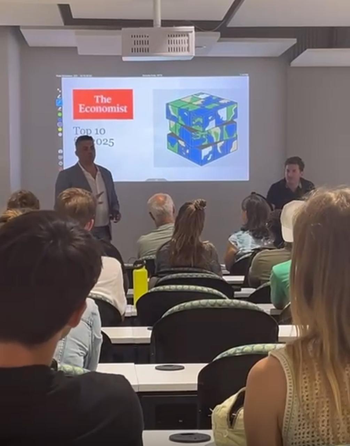
Economics department's newly appointed HOD
Prof. Sophia du Plessis is a well-established academic in the Economics Department at Stellenbosch University. Over the past three decades she has worked for the Department in various roles. Her most recent role has been her appointment as Head of Department.
 Please provide a brief summary of your career as an academic and economist
Please provide a brief summary of your career as an academic and economist
After completing my honours, I began working in an administrative role in the Economics Department, where I was responsible for managing the administration of undergraduate and postgraduate students. I pursued both my master’s and eventually my PhD part-time while working in the Department.
In 1998, I resigned from the administrative role to embark on a year-long adventure with my husband. We lived in San Francisco, California, which allowed me to become a visiting scholar in the Economics Department at Stanford University. There, I attended classes in their PhD programme and participated in some classes at Berkeley. This experience was career-changing. Not only did I “discover” the work of Douglass North, which inspired my PhD in Institutional Economics, but I also had the opportunity to experience academia at a top-ranked university. In 1999, my husband and I returned to Stellenbosch after I received a job offer as a lecturer in the Department of Economics, and he was offered a position at an engineering company in Stellenbosch. After our first son was born in 2001, I transitioned to 50% employment, becoming one of the first permanent part-time academics at the university.
FNB Securities trading game 2024
A team from Stellenbosch University achieved a third-place position in the FNB Securities trading game 2024. Organised by Prof. Hylton Hollander and supported by FNB Securities, the competition challenged students to trade in real-time global markets using a simulated $100 000 portfolio. Over three months, ten teams competed head-to-head, navigating volatile markets and geopolitical uncertainty to achieve the highest returns.
The first and second place teams were from the University of Cape Town:
In first place, team members: Siphelele Mbense, Mojalefa Molahloe, Lindokuhle Xaba, and Mpilontle Mbambo, who achieved an absolute return of 32%. In second place were Darryl Nyamayaro, Shaun Brick, and Jason Joannou, achieving an absolute return of 21%.
The third team, from Stellenbosch, were Oliver Guest, Sam Hardie, Ruan Palvie, and Danshil Naidoo and achieved an absolute return over the preiod of 8%. Their approach was grounded in data-driven decision-making, combining trend-following techniques with insights from social media speculation and geopolitical analysis. They closely monitored platforms like Reddit and Twitter for emerging opportunities and executed trades swiftly to capitalise on short-term volatility. The team acknowledged the challenges of speculative trading but emphasised the importance of risk management and agility in maintaining consistent returns.
Jesse Naidoo heads new Centre for Household Finance
In January, Jesse Naidoo joined the Department of Economics as Senior Researcher responsible for establishing a new Centre for Household Finance. We spoke to him about his move to the Winelands.
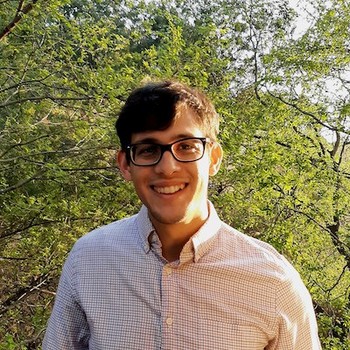
Welcome to the department! Could you tell us a bit about your academic and professional background and what inspired you to pursue a career in economics?
Thanks! I'm very glad to be joining the department and I'm excited to contribute to its future.
I'm an academic for what I think are the typical reasons: I like reading and writing and arguing about ideas. I've been interested in the social sciences since I was a teenager, and economics in particular has a combination of analytical precision and a lack of romanticism that suits me. I studied math as an undergraduate, and I liked it, but at some point I decided I probably didn't have what it took to make much of a contribution there. Economics seemed like a place where I could make a bit more of a difference.
Honorary doctorate in economics and chancellor's award celebrated
 (Photo, from left to right: Hylton Hollander, Willem Boshoff, Neil Rankin, Debra Shepherd, Johan Fourie, Ingrid Woolard, Stan du Plessis, Deirdre McCloskey, Ada Jansen, Rachel Jafta, Dieter von Fintel, Krige Siebrits, Sophia du Plessis, Michael Meyer. Click on photo to enlarge.)
(Photo, from left to right: Hylton Hollander, Willem Boshoff, Neil Rankin, Debra Shepherd, Johan Fourie, Ingrid Woolard, Stan du Plessis, Deirdre McCloskey, Ada Jansen, Rachel Jafta, Dieter von Fintel, Krige Siebrits, Sophia du Plessis, Michael Meyer. Click on photo to enlarge.)
The University recently awarded an honorary doctorate to Prof Deirde McCloskey, a distinguished academic economist in the Unites States interested with interests in economic history, politics, economic philosophy and methodological issues, among others. She has a long-running association with the Department of Economics, and her visit coincided with a series of intellectually stimulating academic events. Read more about Prof Deirdre McCloskey and the honorary doctorate by clicking here.
At the same graduation ceremony, our own Prof Debra Shepherd was honoured with a chancellor's award for excellence in teaching, recognising years of exceptional achievements lecturing economics to undergraduate and postgraduate students. An excerpt from the graduation programme: "Dr Debra Shepherd is being recognized for excellence in Economics teaching in the Faculty of Economic and Management Sciences. Over the past 15 years, she has demonstrated innovative teaching practices, a commitment to student success, and a passion for social justice.In Economics 114, a first-year module that she has taught for the past 13 years, her dedication to creating an inclusive, supportive learning environment fosters a sense of belonging among students. This encourages them to participate and develop critical thinking skills essential for academic and personal success. Dr Shepherd has helped introduce innovative courses such as Data Science for Economists, and Economics of Exclusion, both of which align academic content with real-world issues and foster socially conscious graduates. Underscoring her dedication to transformative education is her leadership as academic principal for the Validus Cluster, as well as her role in the 14-week Ubuntu Learning Short Course, and interdisciplinary programme taught at the Brandvlei Correctional Centre. Her legacy is one of empowering students, challenging societal norms, and using education as a powerful tool for change."
In addition, the Department also celebrates the recent promotions to associate professors of Debra Shepherd and Krige Siebrits.
Stellenbosch Students Win ESSA Founder's Medal Prizes
Two of the Department's students won the 2023 Economic Society of South Africa (ESSA) Founder's Medal's in their respective categories. The intention of the awards is to give national recognition to economic research of outstanding merit among South African Economics students. The winning students were both supervised by Prof Dieter von Fintel (pictured below with Kate Rich). Johannes Coetsee won the prize for the best Master's Research Paper, with his paper "Inequality between whom? Geography, reference groups and protest incidence in South Africa". In this work, he investigates new aspects of the relationship between socioeconomic inequality and protest action in South Africa, such as whether people care most about the inequality they can observe in their close proximity (such as the electoral ward where they live), or whether they are also concerned about inequality further afield, and what role social media plays in this regard. Using machine learning and self-developed measure of local inequality, he confirms the main hypothesis that South African protest is increasingly responding to inequalities beyond the "local", particularly in the period after the advent of social media.
Johannes Coetsee won the prize for the best Master's Research Paper, with his paper "Inequality between whom? Geography, reference groups and protest incidence in South Africa". In this work, he investigates new aspects of the relationship between socioeconomic inequality and protest action in South Africa, such as whether people care most about the inequality they can observe in their close proximity (such as the electoral ward where they live), or whether they are also concerned about inequality further afield, and what role social media plays in this regard. Using machine learning and self-developed measure of local inequality, he confirms the main hypothesis that South African protest is increasingly responding to inequalities beyond the "local", particularly in the period after the advent of social media.
 Kate Rich (recently appointed as a lecturer at the University of Witwatersrand) won the prize for the best Doctoral Thesis, entitled "Socioeconomic status, economic insecurity and the obesity transition in South Africa: generational and life course aspects". Motivated by the significant public health concerns related to very high obesity rates in South Africa, she used public domain longitudinal data to document South Africa’s progression along the obesity transition, with a particular focus on heterogeneity across generations and socioeconomic circumstance. In the first of three papers constituting the thesis, she investigates the relationship between socioeconomic status and obesity, documenting two important trends: Firstly, upward socioeconomic mobility gives initially poor households new access to energy dense foods that increase body mass, and secondly that this trend reverses with further gains in income, but only after after two generations of high socioeconomic status and sustained wealth creation, emphasising that a substantial public health challenge remains. Her second and third papers consider additional factors such as how these changes relate to historical policies such as restrictions on movement, the role of rural to urban migration, and the role of economic insecurity and body mass fluctuations. The thesis makes several important technical advances in data science, econometrics and public health economics.
Kate Rich (recently appointed as a lecturer at the University of Witwatersrand) won the prize for the best Doctoral Thesis, entitled "Socioeconomic status, economic insecurity and the obesity transition in South Africa: generational and life course aspects". Motivated by the significant public health concerns related to very high obesity rates in South Africa, she used public domain longitudinal data to document South Africa’s progression along the obesity transition, with a particular focus on heterogeneity across generations and socioeconomic circumstance. In the first of three papers constituting the thesis, she investigates the relationship between socioeconomic status and obesity, documenting two important trends: Firstly, upward socioeconomic mobility gives initially poor households new access to energy dense foods that increase body mass, and secondly that this trend reverses with further gains in income, but only after after two generations of high socioeconomic status and sustained wealth creation, emphasising that a substantial public health challenge remains. Her second and third papers consider additional factors such as how these changes relate to historical policies such as restrictions on movement, the role of rural to urban migration, and the role of economic insecurity and body mass fluctuations. The thesis makes several important technical advances in data science, econometrics and public health economics.
SU Honorary Doctorate Recipient and Research Collaborator Awarded 2024 Nobel Prize in Economics
We congratulate Prof James Robinson, who has worked with members of the Department of Economics, and who have been awarded an honorary doctorate degree by Stellenbosch University earlier this year, on being a co-winner of the 2024 Nobel Prize in Economics.
Click here to read an article about this on the University's news blog.
Professor prize-winner in PSG/ERSA BigThink Competition
 Johan Fourie was runner-up in the inaugural PSG/ERSA BigThink Competition. Tasked to write an essay to generate inclusive growth, Fourie turned to his field of expertise, economic history, with the essay 'Faster, stronger, together: How knowledge of our past can help us build a prosperous South Africa that works for everyone'. A shortened version is available here or on his blog, Our Long Walk.
Johan Fourie was runner-up in the inaugural PSG/ERSA BigThink Competition. Tasked to write an essay to generate inclusive growth, Fourie turned to his field of expertise, economic history, with the essay 'Faster, stronger, together: How knowledge of our past can help us build a prosperous South Africa that works for everyone'. A shortened version is available here or on his blog, Our Long Walk.Remembering Dr Tito Mboweni: Honorary Professor and Economic Leader
The Department of Economics notes with sadness the passing of Dr Tito Mboweni, Honorary Professor and former Governor of the South African Reserve Bank. Dr Mboweni made significant contributions to South Africa's economic policy, and his connection with the department spanned many years. His deep connection with Stellenbosch was evident not only through his honorary professorship but also through his frequent and engaging talks at our Department. He regularly shared his experience with our students, offering valuable insights into the country's economic landscape.
Dr Mboweni's career, from Minister of Labour to Minister of Finance, was marked by key reforms that shaped South Africa's fiscal and monetary systems. As Governor of the Reserve Bank, he modernised the approach to monetary policy, and his leadership during his time as Minister of Finance influenced several important economic decisions.
We extend our condolences to Dr Mboweni's family and colleagues. His legacy will endure through the policies he shaped and the many students and staff who benefited from his knowledge and experience.
Inaugural lecture: Prof Rulof Burger
Prof Rulof Burger from the Department of Economics in the Faculty of Economics and Management Sciences delivered his inaugural lecture on Tuesday, 7 May 2024. The title of his lecture was “From data to discovery: the role of economists in the era of machine learning".
Fourth Annual Pretoria-Stellenbosch PhD Workshop in Economics
 The fourth annual Pretoria-Stellenbosch PhD Workshop in Economics took place on 9 July 2024 at the University of Pretoria. Ten PhD students and postdocs from universities across the country presented their research, including a number of students from the Department of Economics at Stellenbosch University. The workshop was organised by Jesse Naidoo (UP), Mamello Nchake (SU) and Marisa von Fintel (SU).
The fourth annual Pretoria-Stellenbosch PhD Workshop in Economics took place on 9 July 2024 at the University of Pretoria. Ten PhD students and postdocs from universities across the country presented their research, including a number of students from the Department of Economics at Stellenbosch University. The workshop was organised by Jesse Naidoo (UP), Mamello Nchake (SU) and Marisa von Fintel (SU).
The presentations spanned a range of topics in health economics, education, trade, and labour economics, amongst others. Each student participant was paired with a discussant within their field who gave detailed feedback and comments on their research. The discussants were from universities in the United States, United Kingdom and South Africa This feedback, as well as the lively discussions between participants during the day, was highlighted by student participants as being especially valuable in providing new impetus and motivation for improving their research.
The students from Stellenbosch participating were Wihan Marais (Gravity and Cross-Border Influence: The Importance of Distance in Mobile Telecommunications), Bianca Bohmer (Covid-19 and Inequality in Reading Outcomes in South Africa: PIRLS 2016 and 2021), Valentine Madzudzo (Local Conflict Exposure and Gender Employment Outcomes in eThekwini and Gauteng), Cecilia Njoroge (Decentralisation, Ethnic Favouritism and Water Service Provision: Evidence from Kenya) and Timothy Ngalande (Race-Biased Technological Progress and Growth in 20th-Century Industrial South Africa).
Top 100 Dutch University awards honorary professorship to SU Dean Prof Ingrid Woolard
 Ingrid Woolard, Professor in the Department of Economics and Dean of the Faculty of Economic and Management Sciences (EMS) was recently awarded an honorary professorship from the University of Groningen (UG) in the Netherlands.
Ingrid Woolard, Professor in the Department of Economics and Dean of the Faculty of Economic and Management Sciences (EMS) was recently awarded an honorary professorship from the University of Groningen (UG) in the Netherlands.
Research Revival: Intervarsity Postgraduate Research Conference 2024
 For the first time since the COVID-19 pandemic, the three Western Cape Universities, namely Stellenbosch University (SU), The University of the Western Cape (UWC) and the University of Cape Town (UCT), brought postgraduate students together to showcase their Economics research. Stellenbosch hosted the conference, which was organized by two staff members from the Department of Economics, Michael J. Meyer and Kholekile Malindi. Attendance was impressive, with 140 delegates attending from the three universities, and participation was enthusiastic in terms of questions and discussions between presentations. Sessions were also chaired by students themselves.
For the first time since the COVID-19 pandemic, the three Western Cape Universities, namely Stellenbosch University (SU), The University of the Western Cape (UWC) and the University of Cape Town (UCT), brought postgraduate students together to showcase their Economics research. Stellenbosch hosted the conference, which was organized by two staff members from the Department of Economics, Michael J. Meyer and Kholekile Malindi. Attendance was impressive, with 140 delegates attending from the three universities, and participation was enthusiastic in terms of questions and discussions between presentations. Sessions were also chaired by students themselves.
The conference is intended to develop students' skills to communicate their research and respond to critical questioning, as well as foster collaborative relationships beyond their own institutions, which are vital for promoting research impact and furthering the careers of young researchers. This essential significance of effective communication skills in articulating research ideas, connecting with peers who share common research interests, and networking to obtain feedback from the regional community were underscored in a captivating keynote address by Professor Ada Jansen, the Departmental Chair of Economics at Stellenbosch University.
The topics in the presentations covered many diverse fields within economics. For a list of the presentations, click below.
Professors Leonard Wantchekon and James Robinson awarded honorary doctorates
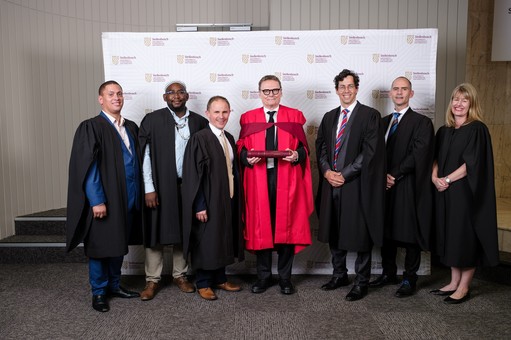
Stellenbosch University awarded honorary Doctor of Commerce degrees to economic experts Professors Leonard Wantchekon and James Robinson during its March 2024 graduation ceremonies for their contributions to economics and academic collaboration in the global south, particularly Africa.
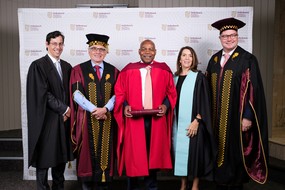
Wantchekon, a Princeton University professor recognized for his work in political economy, development economics, and economic history, expressed his commitment to enhancing academic institutions in Africa. He founded the African School of Economics in Benin to support emerging African economists and policymakers.
Robinson, associated with the University of Chicago, was honored for his research in quantitative economic history in South Africa and his involvement in projects focusing on women's political participation in sub-Saharan Africa. He emphasized the importance of his partnership with SU and his efforts to integrate PhD students into the university's innovative research initiatives.
Prof Dieter von Fintel shares insights about people, place and development at inaugural lecture
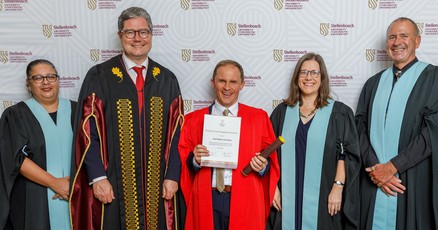
(From left: Prof Ada Jansen, Prof Stan du Plessis, Prof Dieter von Fintel, Prof Ingrid Woolard, Prof Pieter von Wielligh)
Another professorial inaugural event in the Department of Economics took place last week. At this event, it was time to honour prof Dieter von Fintel's research career and appointment as professor. His address to colleagues and guests brought together a huge number of interesting findings from his extensive and diverse research including numerous collaborations with students and academics both local and from around the world.
The topics reflected his specialisation as an econometrician, thus focusing on the use of empirical data to answer deep questions about -- as he delineated it -- people, places and development. He looked at questions like the effects of very early childhood and intergenerational transmission mechanisms affecting economic outcomes in later life, inequality, minimum wages, affirmative action, migration, institutions and many others. A pervasive and very difficult recurrent question is whether seemingly entrenched trends with deep historical roots can be reversed, a question of obvious and vital importance to the development of South Africa.
Prof Von Fintel shared thoughtful insights along the way reflecting his approach to Economics, including the values of honesty, humility, depth and rigour in research. In his words, "we need to acknowledge that there is a lot we don’t know, and that our systems are terribly imperfect to solve humanity’s pressing problems, even if we have made substantial progress at reducing poverty. Our systems fail and ideology cannot cure us of our (in)humanity. My hope is for a world less polarised, more fact-based and more human."
You can view the inaugural address online (click here).
Click here for more information on Prof von Fintel on the university news blog.
Prof Ada Jansen: South Africa can still improve its revenue-raising capabilities
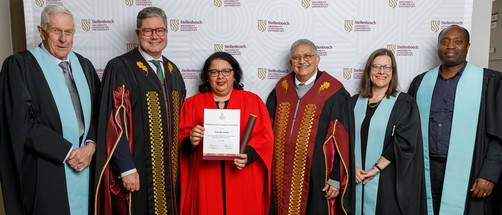
(Picture: Profs Estian Calitz, Stan du Plessis, Ada Jansen, Nico Koopman, Ingrid Woolard and Michael Graham)
Prof Ada Jansen, chair of the Department of Economics at Stellenbosch University, recently delivered her inaugural professorial address to an audience of academics and guests at a function celebrating this important academic milestone. The topic of her address was "Tax revenue and development in South Africa: two sides of the same coin?"
Prof Jansen reiterated the important link between adequate fiscal resources for government to achieve essential developmental objectives including reduction in inequality and poverty, good health services and quality education, before asking whether South Africa, despite its favourable tax collection performance, is raising revenues as efficiently as possible. This question is especially pertinent given the current unfavourable economic and fiscal outlook. The answer is that there are still important gaps that can be addressed that could boost revenue without necessarily increasing tax rates. She continued by discussing policy reform options such as reducing or eliminating tax expenditures that that do not generate plausible social benefits (arguing for a comprehensive reconsideration of the merits of tax incentives), altering the tax treatment of retirement fund contributions, reconsidering VAT zero-rating and further improvements in tax administration.
An important caveat is that revenue reforms unaccompanied by appropriate choices on the expenditure side of the state’s budget, coupled with the institutional and administrative capacity to execute them, is unlikely to promote development effectively. In conclusion, Prof Jansen referenced preliminary research results from a behavioural perspective suggesting that willingness to contribute is not lacking, which bodes well for the future.
Click here to read more about Prof Ada Jansen on the University's news blog
Stellenbosch Hosts Third Pretoria-Stellenbosch PhD Workshop in Economics

Thamsanqa Nhlapo (University of Pretoria) presenting his paper “Minerals, Sectoral Linkages and Structural Transformation in a Small Open Economy”.
A very successful PhD Economics workshop, the third in a series organized jointly by the Departments of Economics at Pretoria and Stellenbosch, was recently hosted by Stellenbosch University on its campus.
The workshop managed to attract close to 30 paper submissions by PhD students and postdocs from universities across the country, of which eight were accepted for the workshop programme. Papers were presented on topics ranging from health economics, macroeconomics, finance to labour economics. (Click here to download the programme.)
Prof Rachel Jafta discusses AI in the World of Business
Prof Rachel Jafta will be a panellist on a forum that discusses the transformative power of artificial intelligence in the World of Business. See below the invitation to join the discussion.
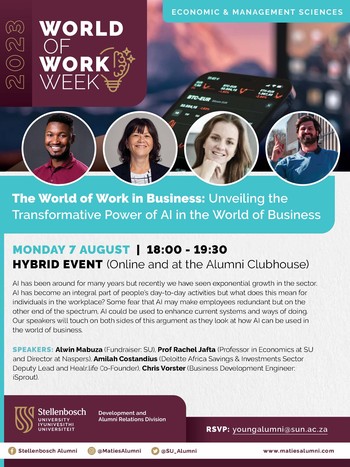
Dr Nchake a panelist on Leader's Angle
The current situation in South Africa feels more and more like the 1980s: growing social division, high levels of tension and violence, even claims of terrorism and calls for a state of emergency. And undoubtedly, the situation of the poor has not changed commensurately with the promises of our new Constitution.
As we look forward to Freedom Day on the 27th of April and Workers Day on the 1st of May, the question becomes: “Is there still room to navigate an economic transition without ever-increasing destructive conflict and violence? And if so, how?”
As in the 1980s, we can probably predict that simply hoping government will change is an insufficient strategy, and that the rest of us will have to commit to an active role in collaborative action...
Book now to join the Leader’s Angle Series event where Prof Brian Ganson will lead a discussion with esteemed speakers Mr Jay Naidoo, Dr Theuns Eloff, Mrs Lesego Serolong Holzapfel and Dr Mamello Nchake that explores solutions towards peaceful economic transformation in South Africa.
Christian Franken awarded 2nd place in Budget Speech Competition
 Once again, a student in the Department did very well in the Nedbank and Old Mutual Budget Speech Competition. Christian Franken, who completed an Honours degree in Economics last year, was awarded the first runner-up place in the postgraduate category of the 2022 competition. Franken won this achievement for his essay entry on the topic, "Evaluate the impact of public infrastructure investment on economic growth based on South Africa’s post-2000 experience. Discuss the impact of this on the prospects for economic growth in the medium term."
Once again, a student in the Department did very well in the Nedbank and Old Mutual Budget Speech Competition. Christian Franken, who completed an Honours degree in Economics last year, was awarded the first runner-up place in the postgraduate category of the 2022 competition. Franken won this achievement for his essay entry on the topic, "Evaluate the impact of public infrastructure investment on economic growth based on South Africa’s post-2000 experience. Discuss the impact of this on the prospects for economic growth in the medium term."
Asked about his achievement, Franken expressed pride and indicated that the competition was fierce, with a lot of exceptional young economists competing. As part of the process, finalists got to meet executives and senior-level managers at Nedbank and Old Mutual, as well as the Finance Minister, Enoch Godongwana at a gala dinner and Franken also indicated the great value in meeting and interacting with the other finalists. Thanks are due to Hylton Hollander from the Department of Economics at Stellenbosch University for motivation, giving tips and making the experience "less daunting and genuinely enjoyable".
Awards ceremony recognizes top performers
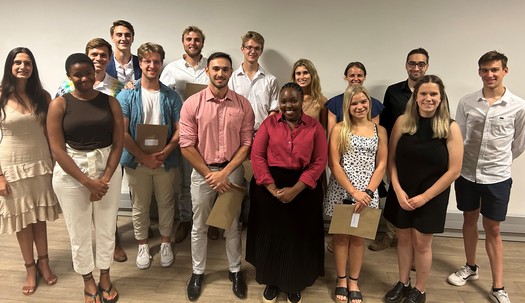
The department hosted its annual Welcoming and Prize-giving function on Wednesday 1 March 2023 to welcome our new intake of postgraduate students and to award prizes to the top performing Economics students in the 2022 academic year. We are very grateful to Economic Research Southern Africa (ERSA) and Genesis Analytics for also sponsoring prizes. Craig Lemboe, Senior Researcher from the Bureau of Economic Research and alumnus (and prospective PhD student) from the Department of Economics was the guest speaker at the event. He gave a very inspiring talk about his journey as economist and left the audience with some very valuable food for thought.
Willem Boshoff considers whether competition policy still serves consumers' needs
On World Consumer Day, Prof Willem Boshoff reflects on competition policy and its effectiveness in the face of multiple objectives not necessarily focused on the wellbeing of consumers.
Prof Willem Boshoff's inaugural lecture: Competition policy in South Africa
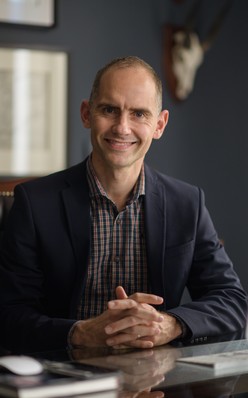 Prof Willem Boshoff, Co-Director of the Centre for Competition Law and Economics in the Department of Economics at Stellenbosch University, recently delivered his inaugural lecture titled “Not at the races: Competition and competition policy in South Africa".
Prof Willem Boshoff, Co-Director of the Centre for Competition Law and Economics in the Department of Economics at Stellenbosch University, recently delivered his inaugural lecture titled “Not at the races: Competition and competition policy in South Africa".
As one of the foremost experts in industrial organization and competition policy, and having been involved as consultant in numerous cases before the competition authorities, Prof Boshoff is a unique position to give an up-to-date, practical and thoughtful perspective. In the inaugural lecture, he argued a number of simple but far-reaching points, firstly that competition is critical to economic growth, but also that competition is not something that can easily be measured by simple proxies such as firm size (which itself is difficult to guage) and associated concentration levels. Instead, what really matters is whether consumers have effective alternative options to choose from, thus indicating that a thorough understanding of the relevant market in which a firm operates is vital to understanding effective competition in each market. Another important point is that effecive competition, thus measured, is very often reduced in markets characterised by government intervention (or outright monopolization). Appropriately focused competition policy is therefore key to supporting an acceleration in investment and growth in the country.
Prof Boshoff has been a lecturer in the Department since 2006. A short interview in connection with the inaugural lecture has been published on the University's news blog.
Sampie Terreblanche's documents now online
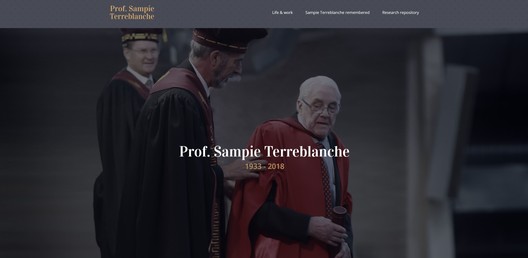
A new website – www.sampieterreblanche.org – now provides access to many of the late professor Sampie Terreblanche's documents. The prolific writings of prof Terreblanche, a legendary professor of Economics in the department who died on 17 February, has now been electronically preserved thanks to the efforts of his family and the department. The website includes links to media articles, books and hundreds of his unpublished monographs. More items will also be added over the next few months, including class notes and photographs. Plans for a bursary in his name are also in the final stages of development.
Centre for Competition Law and Economics
 The newly established Centre for Competition Law and Economics within the Department of Economics has recently launched its own website - click here to visit it.
The newly established Centre for Competition Law and Economics within the Department of Economics has recently launched its own website - click here to visit it.
Why you need to do a postgraduate degree in Economics at Stellenbosch University
Current students give their perspective on a postgraduate degree at Stellenbosch University.
Laboratory for the Economics of Africa's Past (LEAP) launched at Stellenbosch
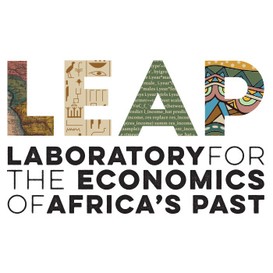 South African research into economic history has gained momentum with the launch of the Laboratory for the Economics of Africa's Past (LEAP) at Stellenbosch University on Wednesday, 27 May.
South African research into economic history has gained momentum with the launch of the Laboratory for the Economics of Africa's Past (LEAP) at Stellenbosch University on Wednesday, 27 May.
"LEAP brings together scholars and students interested in understanding and explaining the long-term economic development of Africa's diverse societies," says Dr Johan Fourie of the Department of Economics.
"Studying the historical development of an economy provides a context for existing challenges and a source of hypotheses to explain the trajectory of its evolution."
Read the full article here, visit the LEAP website, or like the LEAP Facebook page.
ReSEP website launched
The Research on Socio-Economic Policy (ReSEP) group at the Department of Economics today launched a new website which will serve as a resource for researchers and policy-makers interested in issues surrounding socio-economic development in Southern Africa. Spearheaded by Professor Servaas van der Berg, the ReSEP group consists of members of the Department of Economics, contract research staff and graduate students, and developed around a long term research focus on issues of poverty, income distribution, social mobility, economic development and social policy. The new website contains information on ReSEP’s involvement in various research projects, provides access to downloadable working papers, policy briefs, and other research reports produced by members of the ReSEP team, and will in time also provide access to further learning and training materials for policy-makers, researchers, students and others interested in policy debates. Visit the new website at http://resep.sun.ac.za/.
Login
(for staff & registered students)
BER Weekly
23 Jan 2026 Free Weekly Review | Number 3 | 23 January 2026This report covers the key domestic and international data releases over the past week....
Read the full issue
BER Weekly
23 Jan 2026 Free Weekly Review | Number 3 | 23 January 2026This report covers the key domestic and international data releases over the past week....
Read the full issue
